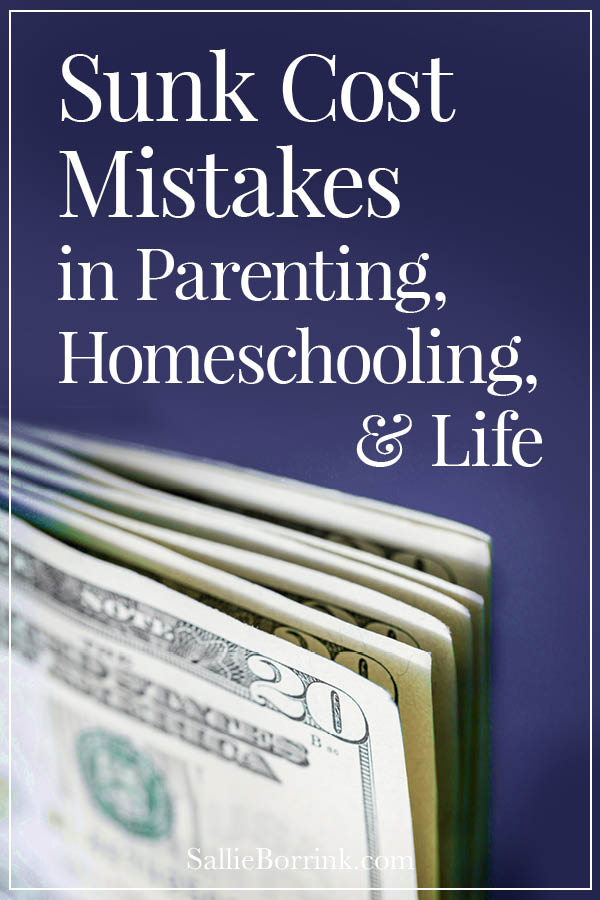Sunk cost is an economic term, but I’ve learned it is very applicable to parenting, homeschooling, and life in general. If you aren’t familiar with it, about.com defines sunk cost this way:
“Sunk costs are costs that are unrecoverable (i.e. nonrefundable) and represent past expenditures. These should not normally be taken into account when determining whether to continue a project or abandon it, because they cannot be recovered either way. It is a common irrational instinct to count them, however.”
The key words in that definition are irrational instinct.
This is a challenging concept for many people to grasp and put into action because it goes against that irrational instinct we seem prone to fall back on. It’s one I’ve had to work at for some time. It’s challenging to make decisions for now and the future and not take into account expenditures you’ve already invested. The expenditures could be money, time, physical effort, or emotional energy.
Examples of Sunk Cost
Let’s look at a few examples of sunk cost that we might encounter as we parent, homeschool, and/or take care of our homes.
Scenario:
You sign your child up for a class and discover after a few weeks that she hates it. It isn’t a good fit, but since you paid money for the class you determine that she has to continue. You aren’t going to waste money. She’s going to suck it up and finish it so you get your money’s worth.
Why is this a sunk cost situation?
You’ve spent the money and it’s gone. Forcing your child to continue to do something that she doesn’t enjoy isn’t going to bring that money back. You’re also forcing her to spend time doing something she really doesn’t like which is a complete waste of your child’s time and life energy. (And subtly punishing her for not liking something isn’t going to do much for your relationship either.)
Scenario:
You purchase a homeschool curriculum everyone you know loves. It is a total failure with your child. You eventually decide to stop using it because it is such a bad fit, but the materials sit on the shelf and mock you because you wasted money on them. You even feel a tiny bit annoyed at your child because you spent all that money for his educational well-being and it didn’t work.
Why is this a sunk cost situation?
Even though you decided to accommodate your child’s learning needs and switch to something else, you still kept the books around because they have “value” of some kind. After all, you spent a lot of money on them! The only way they have value is if you sell them to someone else. So sell them and get back 25% of your money or give them away. But staring at them on your bookshelf isn’t going to bring back the money you spent.
Scenario:
You start homeschooling according to a particular method that sounds like it is just perfect. You buy books, pay for an online course to learn about it, or even invest lots of money attending a special training conference because you are all in and want to do this homeschooling thing right. And then you start and you don’t like it. Your kids don’t like it. But everyone else does so you don’t know what to do. Maybe if you try harder? Maybe if your kids would try harder? You feel you can’t give up because you’ve invested too much to fail.
Why is this a sunk cost situation?
You’ve invested a lot of not only money but emotional energy into a particular homeschooling method. But you aren’t going to get it back. You can perhaps salvage some of what you learned and use it in a different way. But the time and money you invested is gone so it’s time to cut your losses and move on.
Avoiding the Sunk Cost Trap
There are many other examples of sunk cost that can quickly become an unhealthy trap.
- Feeling compelled to finish a restaurant meal when you are already full.
- Going away for a long weekend when you have paid a non-refundable deposit and now you are too tired and just want to stay home.
- Keeping clothing in your closet you don’t like or that doesn’t fit you because it is still “good”.
- Staying at a church that no longer works for your family due to a change in mission or theological views or pastor.
- Keeping your gifted child in a school that doesn’t meet his needs because you’ve already invested so much time and effort into developing relationships, advocating, etc.
In each case, if you make the decision based on the fact that you’ve spent money or invested a lot of energy, you are making an irrational choice. The past efforts you’ve put in will not make the future any better if it is no longer a good fit.
You won’t recoup what you’ve invested in the past by continuing with something that no longer meets your need. Cutting your losses is the wise thing to do. Moving on will probably open up new opportunities including some that will be clearly better for you and your family. When you realize the sunk cost is not recoverable and move on, you’ve made a smart decision to improve your future.










 Daily Life and Priorities in a Creative Relaxed Homeschooling Family
Daily Life and Priorities in a Creative Relaxed Homeschooling Family
Leave a Reply